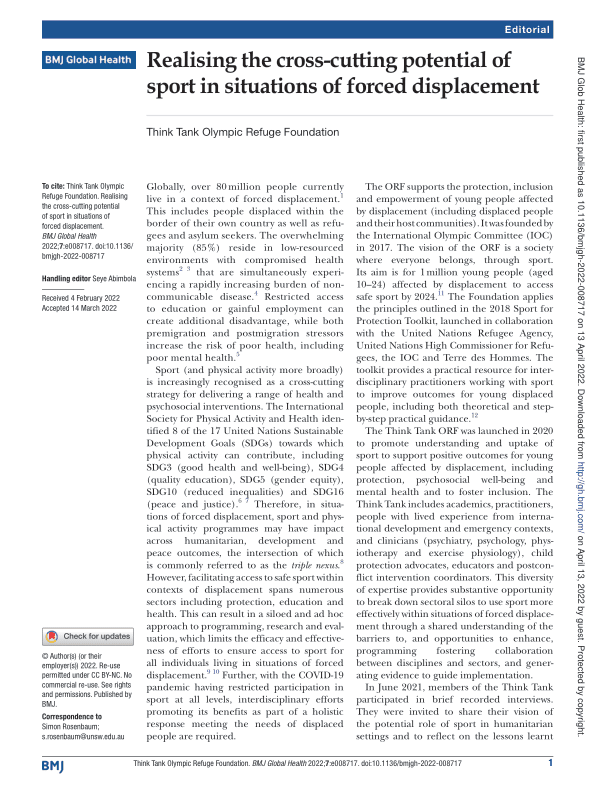Think Tank Olympic Refuge Foundation
Globally, over 80 million people currently live in a context of forced displacement. This includes people displaced within the border of their own country as well as refugees and asylum seekers. The overwhelming majority (85%) reside in low-resourced environments with compromised health systems that are simultaneously experiencing a rapidly increasing burden of non-communicable disease. Restricted access to education or gainful employment can create additional disadvantage, while both premigration and postmigration stressors increase the risk of poor health, including poor mental health.
Sport (and physical activity more broadly) is increasingly recognized as a cross-cutting strategy for delivering a range of health and psychosocial interventions. The International Society for Physical Activity and Health identified 8 of the 17 United Nations Sustainable Development Goals (SDGs) towards which physical activity can contribute, including SDG3 (good health and well-being), SDG4 (quality education), SDG5 (gender equity) , SDG10 (reduced inequalities) and SDG16 (peace and justice). Therefore, in situations of forced displacement, sport and physical activity programs may have impact across humanitarian, development and peace outcomes, the intersection of which is commonly referred to as the triple nexus. However, facilitating access to safe sport within contexts of displacement spans numerous sectors including protection, education and health. This can result in a siled and ad hoc approach to programming, research and evaluation, which limits the efficacy and effectiveness of efforts to ensure access to sport for all individuals living in situations of forced displacement. Further, with the COVID-19 pandemic having restricted participation in sport at all levels, interdisciplinary efforts to promote its benefits as part of a holistic response meeting the needs of displaced people are required.
The ORF supports the protection, inclusion and empowerment of young people affected by displacement (including displaced people and their host communities). It was founded by the International Olympic Committee (IOC) in 2017. The vision of the ORF is a society where everyone belongs, through sport. Its aim is for 1 million young people (aged 10–24) affected by displacement to access safe sport by 2024. The Foundation applies the principles outlined in the 2018 Sport for Protection Toolkit, launched in collaboration with the United Nations Refugee Agency, United Nations High Commissioner for Refugees, the IOC and Terre des Hommes. The toolkit provides a practical resource for interdisciplinary practitioners working with sport to improve outcomes for young displaced people, including both theoretical and step-by-step practical guidance.
The Think Tank ORF was launched in 2020 to promote understanding and uptake of sport to support positive outcomes for young people affected by displacement, including protection, psychosocial well-being and mental health and to foster inclusion. The Think Tank includes academics, practitioners, people with lived experience from international development and emergency contexts, and clinicians (psychiatry, psychology, physiotherapy and exercise physiology), child protection advocates, educators and post-conflict intervention coordinators. This diversity of expertise provides substantive opportunity to break down sectoral silos to use sport more effectively within situations of forced displacement through a shared understanding of the barriers to, and opportunities to enhance, programming fostering collaboration between disciplines and sectors, and generating evidence to guide implementation .
In June 2021, members of the Think Tank participated in brief recorded interviews. They were invited to share their vision of the potential role of sport in humanitarian settings and to reflect on the lessons learned and implications for sport promotion in contexts of forced displacement. Interviews were recorded and transcribed verbatim and analyzed using a condensed version of thematic analysis. Nineteen members of the Think Tank participated in interviews, and five core, yet overlapping themes were identified: (1) sport as a mechanism for holistic and inclusive humanitarian intervention; (2) the vital role of cultural context; (3) sport structures, from grassroots organizations to policy; (4) rigor and generating an evidence base; and (5) addressing microconnections, meso-connections and macro-connections.

